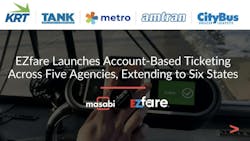EZfare extends to six states as five new transit agencies launch account-based ticketing
Masabi and EZfare announced on Aug. 4 that five more transit agencies have adopted account-based ticketing (ABT), doubling the total number of operators in the region with more to come later this year. These new agencies include AMTRAN and CityBus, who are also new to EZfare with the launch of ABT. This expansion has brought the technology into Pennsylvania and Indiana for the first time. The agencies that have recently gone live are:
- Kanawha Valley Regional Transportation Authority (KRT), the city bus system for the Charleston metropolitan area of West Virginia.
- The Transit Authority of Northern Kentucky (TANK), the public transit system serving the Northern Kentucky suburbs.
- Cincinnati Metro, the public transit agency serving Cincinnati and its Ohio suburbs.
- New to EZfare, Altoona Metro Transit (AMTRAN) is a public transportation service serving Blair County, Penn. It provides bus and paratransit service to Altoona, Hollidaysburg and select communities in the region.
- New to EZfare, CityBus is the public transit provider for the Greater Lafayette area in Indiana, including the cities of Lafayette and West Lafayette.
The new ABT upgrade means that riders will always be guaranteed to get the lowest fare. Fare capping improves fare equity by ensuring all riders, regardless of income, have access to affordable transportation without the need to pay upfront for period passes.
The introduction of ABT ensures a seamless and flexible payment experience for all users, who will no longer need to select their fare or purchase a pass before boarding. Instead, they can tap their smart card or scan the barcode in the EZfare or Transit app to ride, benefitting from increased convenience and faster boarding times.
Smart cards are linked to online accounts, allowing users to manage and reload their accounts using the EZfare Rider Portal or the EZfare or Transit apps, eliminating the need to wait in line or use cash, and delivering a contactless way to pay for transit. These accounts can also be topped up with cash at select retail locations, ticket vending machines or at transit centers.
“Account-based ticketing makes the experience of taking transit quicker, easier and more cost-effective for riders, while at the same time bringing a range of knock-on benefits in terms of vehicle efficiency through reduced boarding times,” said Masabi CEO Brian Zanghi. “The speed and scale of these simultaneous launches across five transit agencies is evidence of the power of both EZfare and Masabi’s [Software-as-a-Service] approach to delivering fare collection. Our Justride platform continues to evolve for all of our customers, bringing new features and functionality through regular upgrades. We’re proud to work with our partner agencies to deliver new innovations to ever more riders.”
EZfare, a regional fare payment platform developed by NEORide in partnership with Masabi, is now used by 18 transit agencies across Ohio, Michigan, Kentucky, West Virginia, and now Indiana and Pennsylvania. NEORide, the Council of Governments representing 39 transit agencies across 11 states, has supported the regionalization of public transit with EZfare, creating a seamless experience for riders across multiple counties and transit systems. It unites transit agencies under one easy-to-use digital fare solution, simplifying travel for residents and visitors alike. Agencies also benefit from economies of scale, reducing costs through shared resources and technology while improving operational efficiency.
“This launch marks a major milestone not just for NEORide but for public transit agencies across the United States,” said NEORide Executive Director Katherine Conrad. “As the largest regional fare collection project in the country, and still growing, EZfare is proving that small and mid-sized agencies can work together to bring cutting-edge technology like account-based ticketing to riders across multiple states. Through collaboration and shared innovation, we can democratize access to modern fare solutions—making fare equity, convenience and seamless travel realities for transit agencies that may not have had the resources to implement these technologies on their own.”
